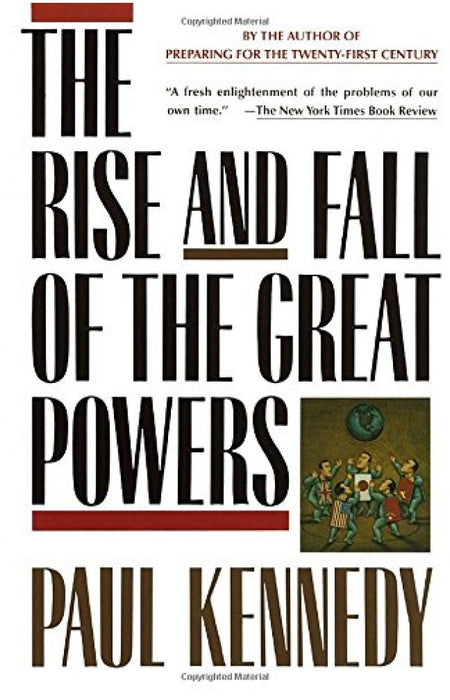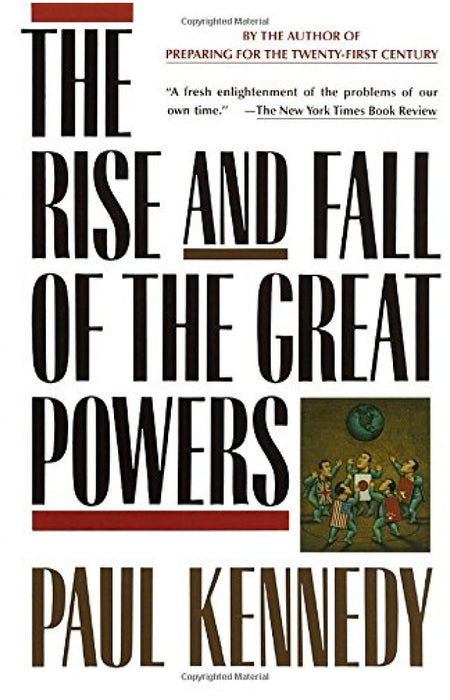The Rise And Fall Of The Great Powers By Paul Kennedy
- Publisher: ENGLISH GENERAL BOOKS
- Availability: In Stock
- SKU: 15079
Rs.425.00
Rs.595.00
Tags: American superpower , decline of nations , economic crises , economic influence , economic overextension , economic strength , geopolitical analysis , geopolitics of the 20th century , global dominance , global power , historical cycles , historical lessons , history of empires , military history. , military innovation , military power , military spending , Paul Kennedy , rise of superpowers , Spanish empire , strategic decisions , superpower decline , technological innovation , The Rise and Fall of the Great Powers
The Rise and Fall of the Great Powers by Paul Kennedy is a comprehensive historical analysis that examines the cyclical nature of great powers and their eventual decline. First published in 1987, the book explores how economic strength, military power, and political strategy have shaped the trajectories of global powers from the 16th century to the 20th century. Kennedy argues that the rise of great powers is often linked to their economic and military capabilities, but their eventual decline is due to overextension, poor strategic decisions, or economic crises. The book provides a deep insight into the interplay between economics, military dominance, and the downfall of global superpowers.
Key Themes and Insights
-
The Rise of Great Powers:
- Kennedy explores the factors that lead to the rise of great powers, including economic growth, military success, and strategic alliances. He highlights the importance of maintaining economic stability and military capabilities to assert dominance on the global stage.
-
Overextension and Decline:
- A central theme of the book is the concept of overextension. Kennedy argues that as powers expand their influence and military reach, they often strain their resources, leading to eventual decline and collapse.
-
The Role of Economics:
- Kennedy emphasizes the importance of economic strength in determining a nation’s rise and fall. He shows that economic resources are the foundation of military power and that economic crises can be the key reason for the decline of great powers.
-
The Influence of Technology and Military Innovation:
- The development and adoption of new technologies play a significant role in the rise of powers, but failure to adapt or invest in military innovation can result in downfall. Kennedy analyzes key technological revolutions, including naval, industrial, and information technologies.
-
The Impact of Strategic Decisions:
- The book highlights critical decisions made by leaders of great powers that shaped their trajectory. Poor leadership, bad strategic choices, and mismanagement of resources often accelerate the decline of powerful nations.
-
Cycles of History:
- Kennedy posits that history follows a cyclical pattern, where empires rise to prominence, peak, and then decline. He draws comparisons between various historical powers, from the Spanish and Dutch empires to the British and American superpowers.
-
Geopolitical Shifts and the Balance of Power:
- The book examines how shifts in global power dynamics, influenced by geography, alliances, and wars, lead to changes in the balance of power among nations.
-
The Role of Military Spending:
- One of the critical elements of a nation's success or failure is its military expenditure. Kennedy argues that excessive military spending without corresponding economic growth often leads to economic crises and decline.
-
The American Century:
- Kennedy provides an in-depth look at the rise of the United States as a global superpower in the 20th century, emphasizing how its economic and military dominance shaped global affairs after World War II.
-
Warning for Future Powers:
- The book serves as a cautionary tale, warning current global powers about the dangers of overextending resources and the long-term consequences of ignoring economic stability in favor of military dominance.
Conclusion
The Rise and Fall of the Great Powers offers a profound exploration of the forces that shape the global power structure. Paul Kennedy's analysis is both historical and forward-looking, providing a blueprint for understanding the cyclical nature of global dominance. By drawing from a broad range of historical examples, Kennedy offers valuable lessons on the management of power, resources, and military engagements. The book is essential reading for anyone interested in geopolitics, history, and the factors that determine the rise and decline of empires.

























